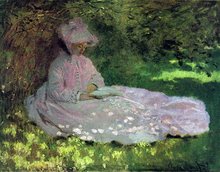This book had an old-school feel to it. Meaning, it reminded me more of Judy Blume's young adult novels (set in the '40s to '70s) than the modern Sisterhood of the Traveling Pants or Twilight series. This had to do in part with the setting (1968 Long Island) but also with the character of Holling himself, the role of Shakespeare's works, names, and the role of women.
Holling Hoodhood as a character was not tormented by ADHD, addicted parents, low self-esteem, a dark crippling secret or overwhelming brilliance. He was just a self aware kid in the 7th grade. Those challenges he did face (lack of money for cream puffs, embarrassment over wearing tights, being faster than the 8th-graders) were explained away (as Holling notes) by the situation of his age and grade: "Mr. Goldman, it's been a long time since you were in seventh grade" (78).
Holling had a positive, humorous outlook on the "trials" he did encounter: "So I did it. I got through the whole dress rehearsal playing Ariel the Fairy while wearing bright yellow tights with white feathers on the ... well, I might as well say it — butt. There. On my butt! White feathers waving on my butt!" (78).
He did not cower when embarrassed by the photo of flying Ariel the Fairy dotted the school walls. Instead, he channeled MacBeth: "... there was a flash of inspiration and ambition" (102).
He did not cower when embarrassed by the photo of flying Ariel the Fairy dotted the school walls. Instead, he channeled MacBeth: "... there was a flash of inspiration and ambition" (102).
So, while Holling had his weaknesses, he was not fragile. He knew himself, he had friends, and in the end, he stood up to his father. At age 13. Some men never do this.
Something else that gave this book an old-school feel to me was all the Shakespeare. The author dug into the classics for this one. Not only was Holling reading the plays and quoting from them, but touches of Shakespeare's lines ran through the narrative: "Still, it was a June day to be blithe and bonny in" (243) when referring to the camping.
The author also played around with language. Holling is marked down on papers for using run-on sentences. Then we, the reader, see run-on sentences galore when Holling has hold of the narrative.
Another old-school moment comes with the names. This might be old-school in the sense that it reminded me of how I used to refer to people. Holling always referred to Doug Swieteck's brother as exactly that. No first name. Teachers and coaches had only last names. His friends had first names only. Holling's father always wanted to know Holling's friends' first and last names.His father was his father, his mother his mother, and his sister his sister; the change came at the very end of the book, when we learn his sister is named Heather. This shows his growing closer to her, using her name.
Finally, it's important to discuss the role of women in this novel. Holling's mother was a shadow. She acted as a sounding board in Chapter 1 when Holling complained about Mrs. Baker. That's it. She was not unique, she hid from us, like she hid her smoking from her husband. On the other end of the scale is Mrs. Baker. Independent. Brave. Giving. Challenging. Confident. She did not hide. She was a strong female role model in an age when women's roles were changing. Look at Holling's sister. She was angry and frustrated that Holling was being considered to inherit the family business. She challenged her father about her clothes, hair, education. Thank God for women like Mrs. Baker and for those like Heather, struggling for the cause of women's changing roles. If nothing changes, nothing changes.
To end, I just want to point out to Katie that Pete Seeger rocks; I'm not the only one who thinks so (108).

2 comments:
Thank you for pointing out the use of names. I didn't notice how Holling stopped referring to his sister as his sister but as Heather. Very nice point. I also liked your point about Holling having weaknesses, but not being fragile. We all have weaknesses, but we all should be able to deal with them and not let them rule our lives.
Of course Pete Seeger rocks - he's iconic!
Great review! I liked your points on the womens' roles.
I loved all the Shakesphere focus too!
Post a Comment